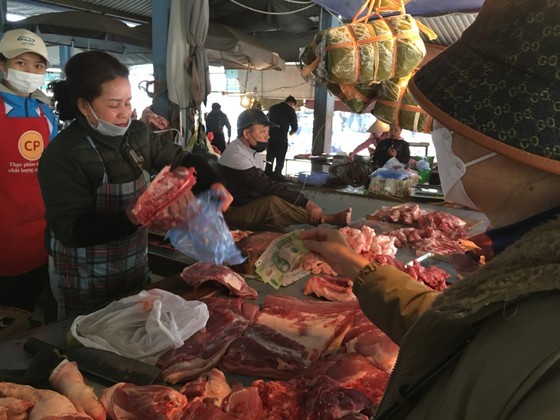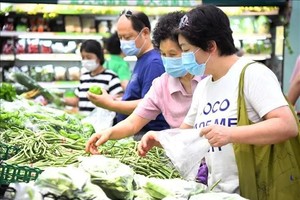 |
Prices of pork fall this year in the run-up to the Tet holiday |
In previous years, usually during the Lunar New Year, the prices of pork, chicken and other foods all skyrocketed. But this year, almost no items increased fever, even the price of pork dropped sharply.
According to the survey, this morning when the Vietnamese traditional Tet (Lunar New Year) holiday is only two days away, inhabitants in localities went to supermarkets and traditional markets to shop for Tet.
However, the price of pork has not increased. Specifically, in Hanoi, it was generally at VND 52,000 per kg while it fluctuated from VND52,000 to VND53,000 per kg in the Central region and it was VND 51,000 a kg in the Mekong Delta Province of Ben Tre and pork was sold at VND 53,000 a kg in southern provinces including Ba Ria - Vung Tau, Soc Trang, Dong Thap.
According to the Department of Livestock Production under the Ministry of Agriculture and Rural Development, the prices of pork have decreased significantly compared to 2-4 months ago and breeders suffered losses. In August 2022, the price of pork still fluctuated at VND62,000 - VND70,000 a kg. In October 2022, it decreased to about VND59,000-VND60,000 a kg; the current price is the lowest price.
The price of hogs has now decreased by VND10,000-VND17,000 a kg compared to August 2022. Many pig breeders in Hanoi said that the price of VND52,000 a kg is the general level; but, in recent days, some farmers in fact only sold for VND47,000-VND48,000 a kg to traders to clear the barn for Tet holiday.
A pig farmer in Chuong My District in Hanoi moaned that farmers were losing about VND400,000 - VND600,000 a pig on average.
This morning, pork prices were ranging from VND80,000-VND85,000 a kg in different markets while the highest price for delicious meat is only VND110,000-VND120,000 a kg.
There are many reasons why the price of farmed pigs has plummeted like this year. According to the Department of Livestock Production, the reason that pork prices are still low near Tet is due to economic difficulties, many businesses have reduced orders to reduce production, and lay off workers; many workers have had to reduce their hours or take a pay cut due to the economic fallout resulting in low earnings and Tet bonuses; consequently, people had no choice but to cut back on spending, not only pork but many other foods this year had not strong purchasing power. While this year, many FDI livestock enterprises increased their herds.
The summary data for 2022 of the Ministry of Agriculture and Rural Development shows that up to now, the total pig herd of the country is about 28.6 million pigs, an increase of 3.2 percent while it was only 24 million pigs four or five years ago. Because supply exceeds demand, FDI enterprises have to reduce selling prices to promptly push them to the market.
























